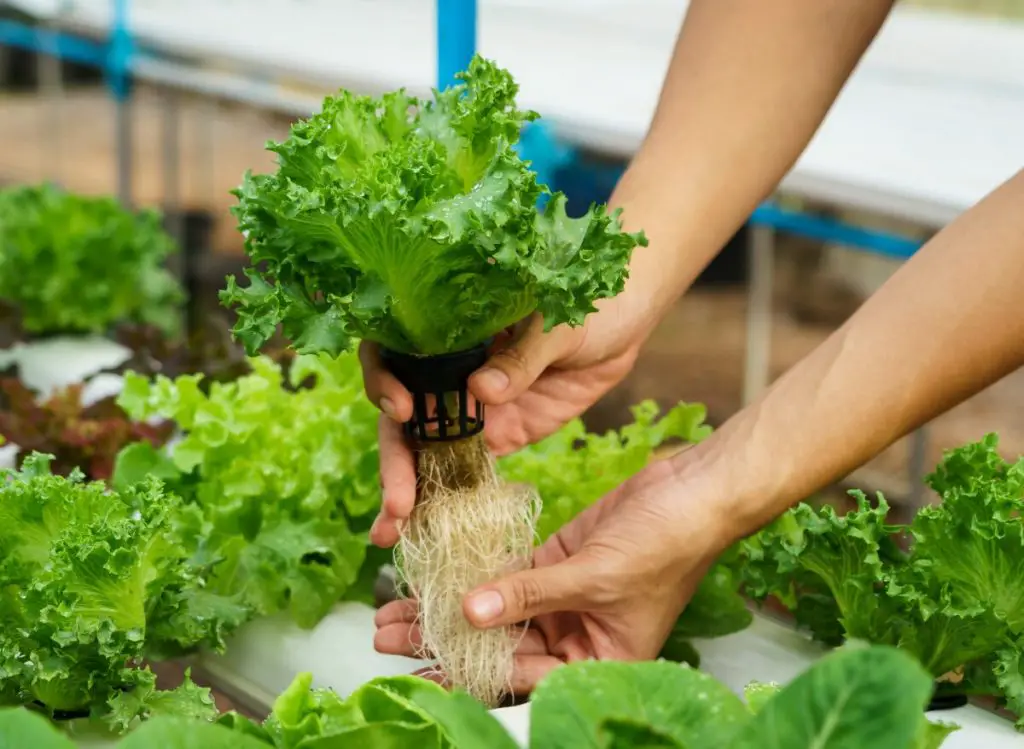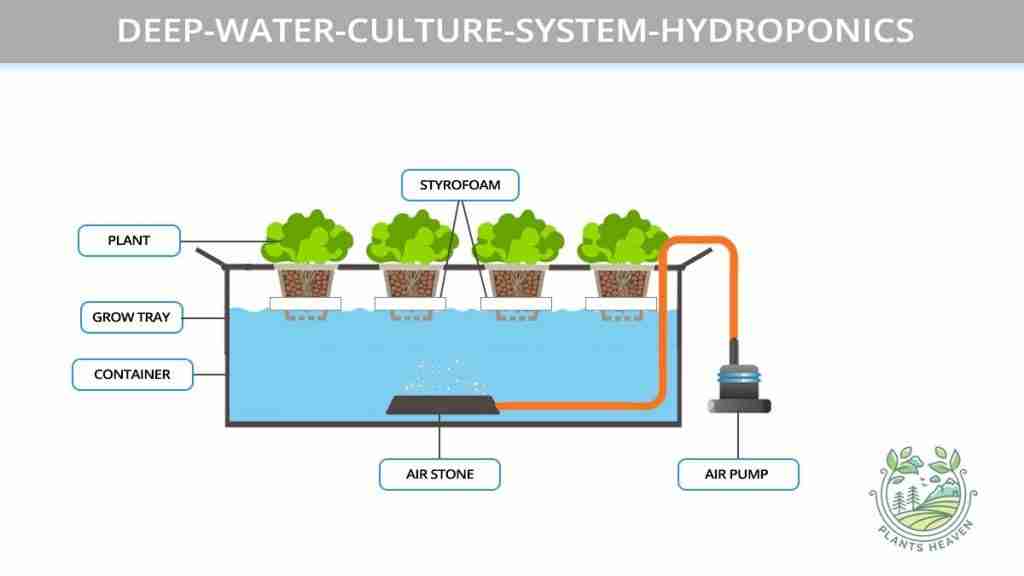Deep Water Culture (DWC) is indeed a type of hydroponics in which plant roots are submerged in a nutrient solution reservoir that is highly oxygenated and hygienic. Using the best DWC nutrients possible is essential to the success of your hydroponic systems.
In Water Culture (DWC), the plants’ roots are normally nested inside a netted container with an airline linked to the pump. Because hydroponic systems range so much in terms of how they supply and disperse fertilizers to plant roots, it’s only natural that nutrient requirements differ as well.
Now, these differences aren’t huge – after all, hydroponic gardening is just growing plants in a nutrient solution rather than soil – but selecting the best nutrient for your hydroponically should be a top concern.
Read on to find out everything you need to know about choosing the best DWC nutrients for your system. You might also enjoy reading: 6 Best Hydroponic Pumps For Your Hydroponics System.

What Does Deep Water Culture (DWC) Mean?
Unlike other hydroponic techniques, including the Ebb and Flow, Aeroponics, and Drip System, where plants are only watered frequently, the Deep Water Culture ((DWC) is a hydroponic growing technique that nurtures plants’ roots in a well-oxygenated and rich nutrients solution and water 24/7. With the DWC, the plants’ roots must be submerged deep in the water.
With the DWC, you need three main things to grow plants successfully: water, nutrients, and oxygen. In the same way, you manage the supply of water and oxygen; you should also manage the proper nutrient supply to allow your plants to thrive.
The reservoir containing the plants must hold an adequate amount of water. The more water you add to the reservoir, the more stable the nutrient solution will be, and the less monitoring and maintenance are required.
A successful DWC should contain all the necessary micro and macronutrients.
Deep Water Culture (DWC) is one of the easiest and most effective hydroponic systems. The name DWC stands for Deep Water Culture or Direct Water Culture.
See also: How To Successfully Grow Carrots Hydroponically?

How Do You Choose The Best Nutrients for Your DWC?
Whether a beginner or an experienced grower, choosing the best DWC nutrients is essential in succeeding with any hydroponic system. Here is a checklist to keep in mind to help pick the best DWC nutrients.
1- Understanding Your Plants’ Nutrient Needs
Nitrogen, Phosphate, and Potassium (aka the NPK ratio) are the three best DWC nutrients for plant growth. The NPK ratio will be listed on every container of hydroponic fertilizer solution you come across.
As an example, a nutritional solution labeled with an NPK ratio of 4-3-6 would include 4% nitrogen, 3% phosphorus, with 6% potassium.
Generally, every plant requires phosphorus, calcium, nitrogen, and other vital elements for proper nutrition.
Even though most plants require practically the same micro and macronutrients, the solutions’ ratios typically vary significantly, depending primarily on the kind of plant you are growing.
The key is to understand your plants’ nutrient needs to provide the best nutrients for DWC plants to thrive.
- Meso-nutrients: Mg, Calcium, and Sulfur are secondary macro-nutrients.
- Micronutrients: Plants require iron, boron, chlorine, copper, manganese, molybdenum, and zinc, among other micronutrients
See also: Is PVC Really Safe For Organic Gardening?
2- Keep The Nutrient Solution’s pH Level Optimal
Make sure you keep an eye on the pH level of your DWC system, do not take it lightly because it can ultimately kill your hydroponic plants.
The pH of a nutrient solution affects the availability of nutrients, so you keep it in the optimum range.
Generally, nutrient solutions used for hydroponic systems, including DWC, should have a pH between 5 to 6 (usually 5.5), according to Oklahoma State University.
The range at which nutrients are most readily available to plants is 6 to 6.5; ensure you maintain a pH between 6 to 6.5 in your DWC system.
You can use an electronic pH meter to measure the pH level of water in DWC hydroponics. And more importantly, remember to customize the pH level to the stage of your plant’s growth. Typically, plants at their vegetative stage will require higher pH than flowering plants.
It’s a little more difficult to keep track of your system’s pH levels – the measure of acid within your growing reservoir – than it is to keep track of your EC levels. pH monitors must be correctly calibrated and used with caution.
3- Check Your Electrical Conductivity (EC) Measurement
Electrical Conductivity is the ratio of the nutrient solution comparable to the amount of water. The objective is to keep the EC level between 0.8 to 3, with the normative value set between 1.5 to 2.5. The easiest way to check your EC is to use Electronic EC meters.
A lower EC is usually not harmful because you can adjust upwards. However, setting a high EC can be concerning because you risk a nutrient burn, which means your plants will dry out or die because of too much fertilizer.
To bring your EC down to an acceptable range, you need to add more water.
- EC meters are often used to determine the electrical conductivity value of a nutrient solution – the amount of fertilizer or salt content.
- You don’t need an EC meter if you’re using a pre-made, advertising nutrient solution, but it can be useful if you’re experimenting with your nutrient solution if you think you’re adding nutrients too rapidly to your reservoir, or if you want so much insight and data about the conditions of ones growing reservoir.
- In the best DWC nutrients system, EC values are between 1.2 and 2.0.
4- Verify Your Nutrient Solution’s Oxygen Level
Defining the oxygen level of your nutrient solution will help properly oxygenate your DCW plants.
Similar to the pH level and EC measurement, you should also optimize the oxygen level in your DWC system. You can use dissolved oxygen meters or manually monitor the right temperature and run an air pump.
When the oxygen level is too low, toxins will accumulate, reducing the permeability of the roots to water and minerals, leading to both insufficiencies.
If the oxygen is too high, extreme oxygenation will lead to poor absorption of the necessary nutrients and minerals. High or lower oxygenation can lead to a significant loss in your plants’ growth.
5- Media for Deep Water Culture
It is just as vital to choose the correct medium as it is to keep an eye on the pH and EC values to keep track of the best DWC nutrients.
Media is used in hydroponic systems to not only hold plant roots in place but also to give ample aeration and moisture to them.
Tips For Choosing Growth Media for DWC:
- Clay stones are the most popular Deep Water Culture growth substrate because they are affordable, porous, recyclable, and pH neutral.
- Growstones are a little more specialized since they are more costly, but make no mistake: they get the task done! They were heavier than either of the perlite and clay pebbles, but not to the point of causing root injury.
- Perlite is another low-cost growing medium that delivers enough oxygen to plant roots while yet maintaining moisture. It’s also constructed of volcanic rock, which is rather unique!
- Avoid a medium that contains little to no nutrients; also, you don’t want your system’s medium to change the pH or EC levels of your nutrient reservoirs.
- Choose a growing medium that is heavy enough to offer support for developing plants in a nutrient solution that is circulating but not so heavy that the roots are damaged.
Top 3 Best DWC Nutrients
Let’s look at the best DWC nutrients in more depth. Growing media, conductivity ratings, and pH readings will also be discussed.
1- General Hydroponics FloraBloom
General Hydroponics’ FloraBloom is among the best DWC nutrients because it stimulates fruit and flower development and assists your plants in all stages of their blooming cycle.
In addition, the product contains phosphorus, potassium, magnesium, and sulfur, essential for well-balanced plant growth.
More importantly, General Hydroponics’ FloraBloom enhances your water solution’s flavor, aroma, and essential oils.
2- Botanicare CNS17
Botanicare CNS17 provides your plants with balanced nutrients; therefore, you don’t need to use different nutrients.
Botanicare CNS17 provides your plants with all the 17 best nutrients for DWC in a single bottle for optimal plant growth, which enables your plants to produce higher yields.
It is cost-effective with its highly concentrated formula and gives the premium results every grower and hobbyist hopes for. It is rich in calcium, nitrogen, and phosphorous levels for improved root development and sturdier branches and stalks.
3- General Hydroponics FloraGro 2-1-6
General Hydroponics FloraGro 2-1-6 includes nitrogen, phosphorus, potassium, and other secondary minerals that supply your plants with all the needed nutrients.
General Hydroponics FloraGro 2-1-6 helps build healthy plant roots that stimulate structural and vegetative plant growth.
How Often Do You Add Nutrients to DWC?
Whenever the plants are young, the plant must come into touch with the nutrient and absorb them for the plants to receive water. The root will grow and absorb additional nutrients as the plant age, allowing the nutrient solution level to be lowered.
As a result, you should take your plants from the reservoir every 1-2 weeks (the longest that should wait before replacing your nutrient is three weeks) to change and freshen your hydro nutrient, then return the plants to the reservoir.
What Is The Best pH For DWC?
The best pH for the DWC range between 5.5 to 6.0, and it is considered the ideal range for most crops.
If you want to ensure the proper growth of your crops or plants, then ensure you maintain your DWC system’s pH level between 5.5 to 6.0. It is ideal in all types of situations and ensures that the crops are getting all the essential nutrients.
See also: 6 Different Kinds of Hydroponics (And their pros and cons).
Wrapping Up
Choosing the right DWC nutrients is one of the most important steps in setting up a successful hydroponics system.
Here are the top 3 DWC nutrients:


